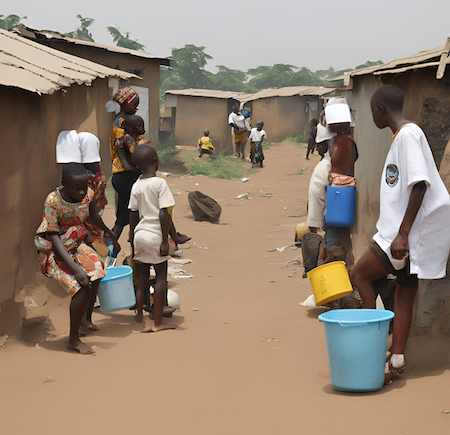IMCW Causes
Prison Reform Advocacy Initiative
1. Introduction
The IMCW Foundation Prisons Reform Advocacy Initiative aims to address and improve the conditions within the Nigeria Correctional Services system, advocate for policy changes, and support the reintegration of formerly incarcerated young male individuals into society.
2. Objectives
- Improve Prison Conditions: Ensure humane and dignified conditions for all inmates.
- Policy Reform: Advocate for legislative changes to improve the justice system.
- Reintegration Programs: Support the rehabilitation and reintegration of formerly incarcerated young male individuals.
- Awareness and Education: Raise public awareness about the issues within the prison system.
3. Key Activities
3.1. Research and Data Collection
- Activity: Conducting comprehensive research on current prison conditions, policies, and rehabilitation programs.
- Timeline: Months 1-3
- Responsibility: Research Team
- Outcome: Detailed report on the current state of prisons.
3.2. Stakeholder Engagement
- Activity: Identify and engage with key stakeholders, including government officials, prison authorities, NGOs, and former inmates.
- Timeline: Months 2-4
- Responsibility: Outreach Team
- Outcome: Establishment of a network of stakeholders.
3.3. Public Awareness Campaign
- Activity: Develop and launch a public awareness campaign using social media, public service announcements, and community events.
- Timeline: Months 3-6
- Responsibility: Communications Team
- Outcome: Increased public awareness and engagement.
3.4. Policy Advocacy
- Activity: Draft policy recommendations and engage in advocacy efforts with policymakers.
- Timeline: Months 4-8
- Responsibility: Policy Team
- Outcome: Submission of policy proposals to relevant authorities.
3.5. Rehabilitation and Reintegration Programs
- Activity: Develop and implement programs aimed at supporting the rehabilitation and reintegration of formerly incarcerated individuals.
- Timeline: Months 6-12
- Responsibility: Program Team
- Outcome: Operational reintegration programs with measurable success rates.
3.6. Monitoring and Evaluation
- Activity: Continuously monitor the progress of the initiative and evaluate its impact.
- Timeline: Ongoing
- Responsibility: M&E Team
- Outcome: Regular reports on the initiative’s progress and impact.
4. Timeline
| Activity | Month 1 | Month 2 | Month 3 | Month 4 | Month 5 | Month 6 | Month 7 | Month 8 | Month 9 | Month 10 | Month 11 | Month 12 |
| Research and Data Collection | X | X | X | |||||||||
| Stakeholder Engagement | X | X | X | |||||||||
| Public Awareness Campaign | X | X | X | X | ||||||||
| Policy Advocacy | X | X | X | X | ||||||||
| Rehabilitation & Reintegration | X | X | X | X | X | X | X | |||||
| Monitoring and Evaluation | X | X | X | X | X | X | X | X | X | X | X | X |
5. Evaluation Metrics
- Improvement in Prison Conditions: Measure changes in living conditions, health services, and inmate treatment.
- Policy Changes: Track the adoption and implementation of proposed policy reforms.
- Reintegration Success Rates: Monitor the rate of successful reintegration of former inmates into society.
- Public Awareness: Assess changes in public knowledge and attitudes towards prison reform through surveys and media analysis.
6. Budget
| Item | Cost (Naira) |
| Research and Data Collection | 10,000,000 |
| Stakeholder Engagement | 8,000,000 |
| Public Awareness Campaign | 15,000,000 |
| Policy Advocacy | 12,000,000 |
| Rehabilitation and Reintegration | 20,000,000 |
| Monitoring and Evaluation | 5,000,000 |
| Total | 70,000,000 |
7. Team Roles and Responsibilities
- Project Manager: Oversee all activities and ensure timelines are met.
- Research Team: Conduct research and compile reports.
- Outreach Team: Engage with stakeholders and build partnerships.
- Communications Team: Develop and manage the public awareness campaign.
- Policy Team: Draft policy recommendations and conduct advocacy.
- Program Team: Develop and implement rehabilitation and reintegration programs.
- M&E Team: Monitor and evaluate the initiative’s progress and impact.
8. Risks and Mitigation
- Risk: Lack of stakeholder engagement.
- Mitigation: Proactive communication and involvement strategies.
- Risk: Insufficient funding.
- Mitigation: Fundraising and grant applications.
- Risk: Resistance to policy changes.
- Mitigation: Building strong, evidence-based cases and alliances with influential stakeholders.
9. Conclusion
The IMCW Foundation Prisons Reform Advocacy Initiative aims to make meaningful changes in the prison system through a structured and multi-faceted approach. By focusing on research, stakeholder engagement, public awareness, policy advocacy, and reintegration programs, the initiative seeks to create a more humane and just prison system. Join Us…donate to this cause.
10. Donate to this cause:











